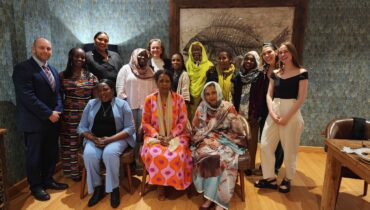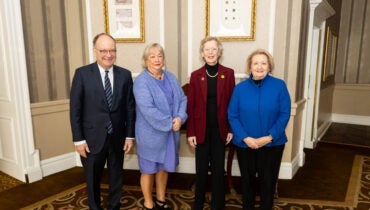The humanitarian costs of the Syrian conflict have consumed news headlines for months. News coverage has focused on the targeted bombings of civilian neighborhoods and chronic water, food, and medical supply shortages within Syria, along with the lack of educational and vocational opportunities for refugees living in neighboring Arab states. But there are two lesser known threats to the safety and well-being of refugees: child marriage and limited legal protection for children born to refugees. Increasing rates of child marriage among refugees are detrimental, as child marriage causes immediate threats to young brides and also reduces the levels of education and future economic productivity for this generation of girls. Child marriage further exacerbates the problem of an expanding generation of refugee children who will grow up without basic security, citizenship papers, or health and education services.
Child marriage existed in Syria before the civil war began, when about 13% of girls under the age of 18 were married. But that rate has since skyrocketed among Syrians refugees. A 2014 UNICEF report documents that between 2011 and 2014 the prevalence of child marriages among registered Syrian marriages in Jordan increased from 12% to 32%. A 2015 study by the Lebanese Saint Joseph University indicates that 23% of Syrian women living in Lebanon are married before age 18. These studies point out common factors leading to child marriage, including attempts to alleviate the poverty burden of raising a large family and provide protection for young girls. However, while many families may believe they are helping their daughters by marrying them off at a young age, in fact they are further risking their daughters’ future health and development. Child marriage is proven to have immediate consequences for girls, such as increased rates of pregnancy complications and higher risk of becoming trapped in an abusive relationship. Child brides also face a loss of schooling and limited economic opportunities, trapping the girls and their children in a cycle of poverty and reducing longer term productivity.
The children resulting from child marriages face an additional hurdle: many will never be registered as citizens of an official state and thus grow up stateless. These stateless children are not just the products of child marriages. Estimates point to 70% of Syrian children born in Lebanon not having an official birth certificate. 25% of Syrian refugee children’s fathers have either been killed or are no longer involved with their mother. Because Syrian citizenship is passed only through the father, these children’s births cannot be officially registered if the fathers are dead or unknown. There are also barriers to registering births in host countries, such as the need to provide a marriage certificate, which makes it difficult even for fully intact families to receive proper documentation. Children without valid birth certificates will grow up in a state of limbo and can be denied access to health care and education within host countries. Even more problematically, if the crisis does get resolved and families begin to move back to Syria, children without birth certificates or other documentation will struggle to become part of formal political or economic systems.
A pernicious cycle has developed. The Syrian crisis causes social, economic, and physical insecurity of families, leading them to marry off their young daughters in hopes that the marriage provides security. But child marriage only further fuels situations of poverty and inadequate resources, thereby making future child marriages more likely. This cycle is exacerbated by and continues to exacerbate the lack of quality education, socio-psychological services, and employment opportunities for Syrian refugees and could possibly result in two “lost generations” who will not be prepared to help rebuild Syria should a peace-agreement be secured.
There are many ways to prevent more child marriages and provide support for girls already married. Education is key and its power is two-fold: it empowers girls so they have greater negotiating power to decline an unwanted marriage and it alerts families to the dangers of child marriage. The UN Population Fund has already set up a peer-education campaign that includes refugees, and Save the Children runs classes for families about the risks of child marriage. Because child marriage is often a last resort for a family struggling to provide for their children, economic incentives like loans to cover education costs or income-generating skills training can be helpful. Both tactics change how a daughter is viewed: from a burden to her family to being a contributing member.
Legal action is also needed both regarding child marriage and stateless children. Laws exist in Lebanon and Jordan forbidding child marriage but the international community must hold the host countries accountable for enforcing these protections. Further, birth registration is the right of all children under international law so a more accessible and visible process for providing, at minimum, birth certificates for all refugee children is needed. Even if these children do not have full Syrian citizenship today, they will have the official documentation to help get citizenship, in Syria or elsewhere, in the future.
Ultimately, no solution will be successful without the full buy-in of IGOs, NGOs, donor countries, and the host governments. Current education campaigns, birth registration clinics, and other interventions are run only in specific camps or neighborhoods and without coordination between all organizations working on refugee issues. There needs to be a broad shift to shaping all refugee policy so as to prioritize refugee children, especially young, female ones. If the legal and policy focus on refugees can be shifted from national security to human well-being, then there will be a much more conducive environment for NGOs and aid workers to address, on the ground, the issue of child marriage and stateless children.
About the Author
Katherine Butler-Dines is a research assistant on the Women & Economy Project. She is a senior in the School of Foreign Service at Georgetown University. She is majoring in Regional and Comparative Studies with a focus on the Middle East and North Africa, and is also pursuing a certificate in Religion, Ethics and World Affairs through the Berkley Center. She has studied abroad in both Jordan and Morocco and is working toward fluency in Arabic.


